初中三年级人教新目标英语,九年级同步辅导
- 格式:doc
- 大小:113.50 KB
- 文档页数:7
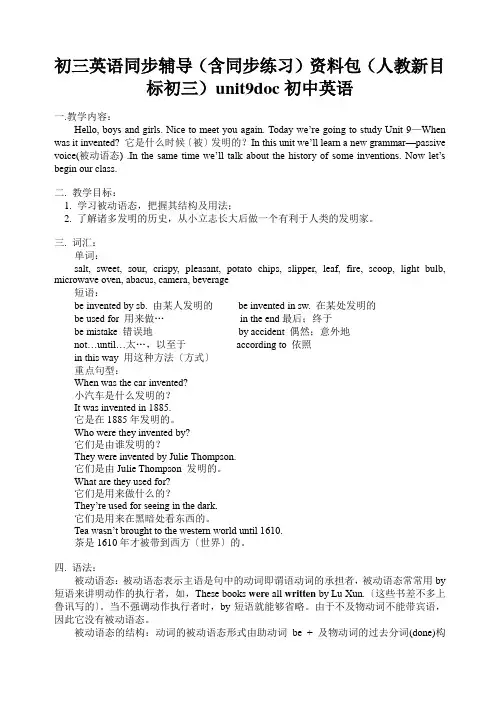
初三英语同步辅导(含同步练习)资料包(人教新目标初三)unit9doc初中英语一.教学内容:Hello, boys and girls. Nice to meet you again. Today we’re going to study Unit 9—When was it invented? 它是什么时候〔被〕发明的?In this unit we’ll learn a new grammar—passive voice(被动语态) .In the same time we’ll talk about the history of some inventions. Now let’s begin our class.二. 教学目标:1. 学习被动语态,把握其结构及用法;2. 了解诸多发明的历史,从小立志长大后做一个有利于人类的发明家。
三. 词汇:单词:salt, sweet, sour, crispy, pleasant, potato chips, slipper, leaf, fire, scoop, light bulb, microwave oven, abacus, camera, beverage短语:be invented by sb. 由某人发明的be invented in sw. 在某处发明的be used for 用来做…in the end最后;终于be mistake 错误地by accident 偶然;意外地not…until…太…,以至于according to 依照in this way 用这种方法〔方式〕重点句型:When was the car invented?小汽车是什么发明的?It was invented in 1885.它是在1885年发明的。
Who were they invented by?它们是由谁发明的?They were invented by Julie Thompson.它们是由Julie Thompson 发明的。
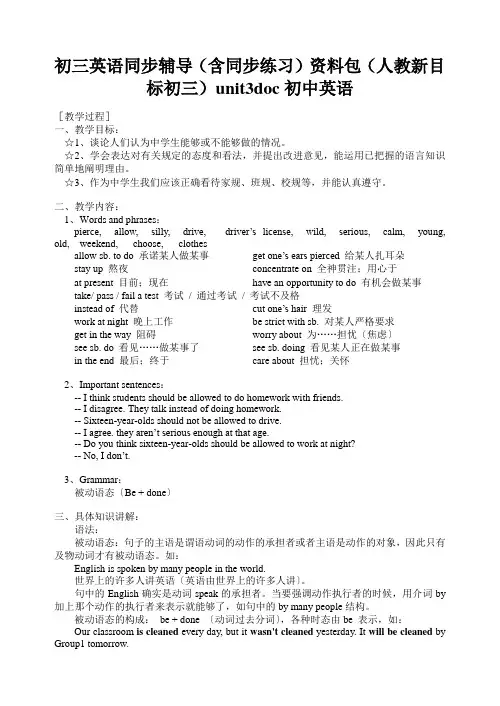
初三英语同步辅导(含同步练习)资料包(人教新目标初三)unit3doc初中英语[教学过程]一、教学目标:☆1、谈论人们认为中学生能够或不能够做的情况。
☆2、学会表达对有关规定的态度和看法,并提出改进意见,能运用已把握的语言知识简单地阐明理由。
☆3、作为中学生我们应该正确看待家规、班规、校规等,并能认真遵守。
二、教学内容:1、Words and phrases:pierce, allow, silly, drive, driver’s license, wild, serio us, calm, young, old, weekend, choose, clothesallow sb. to do 承诺某人做某事get one’s ears pierced 给某人扎耳朵stay up 熬夜concentrate on 全神贯注;用心于at present 目前;现在have an opportunity to do 有机会做某事take/ pass / fail a test 考试/ 通过考试/ 考试不及格instead of 代替cut one’s hair 理发work at night 晚上工作be strict with sb. 对某人严格要求get in the way 阻碍worry about 为……担忧〔焦虑〕see sb. do 看见……做某事了see sb. doing 看见某人正在做某事in the end 最后;终于care about 担忧;关怀2、Important sentences:-- I think students should be allowed to do homework with friends.-- I disagree. They talk instead of doing homework.-- Sixteen-year-olds should not be allowed to drive.-- I agree. they aren’t serious enough at that age.-- Do you think sixteen-year-olds should be allowed to work at night?-- No, I don’t.3、Grammar:被动语态〔Be + done〕三、具体知识讲解:语法:被动语态:句子的主语是谓语动词的动作的承担者或者主语是动作的对象,因此只有及物动词才有被动语态。
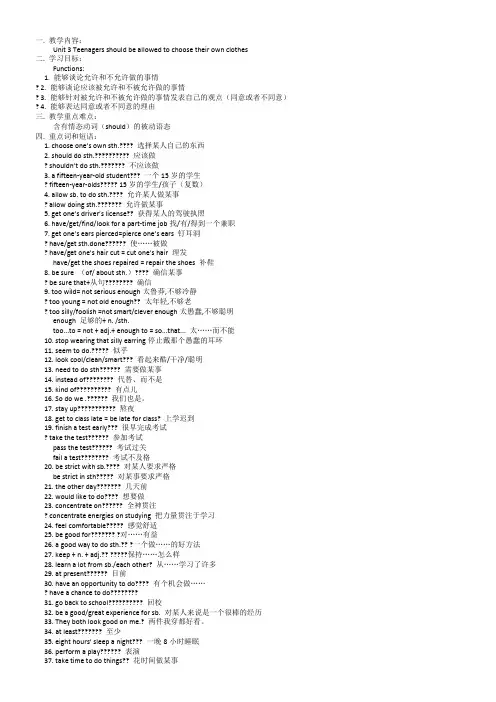
一. 教学内容:Unit 3 Teenagers should be allowed to choose their own clothes二. 学习目标:Functions:1. 能够谈论允许和不允许做的事情? 2. 能够谈论应该被允许和不被允许做的事情? 3. 能够针对被允许和不被允许做的事情发表自己的观点(同意或者不同意)? 4. 能够表达同意或者不同意的理由三. 教学重点难点:含有情态动词(should)的被动语态四. 重点词和短语:1. choose one’s own st h.???? 选择某人自己的东西2. should do sth.?????????? 应该做? shouldn’t do sth.??????? 不应该做3. a fifteen-year-old student??? 一个15岁的学生? fifteen-year-olds????? 15岁的学生/孩子(复数)4. allow sb. to do sth.???? 允许某人做某事? allow doing sth.??????? 允许做某事5. get one’s driver’s lice nse?? 获得某人的驾驶执照6. have/get/find/look for a part-time job找/有/得到一个兼职7. get one’s ears pierced=pierce one’s ears 钉耳洞? have/get sth.done?????? 使……被做? have/get one’s hair cut = cut one’s hair 理发have/get the shoes repaired = repair the shoes 补鞋8. be sure (of/ about sth.)???? 确信某事? be sure that+从句???????? 确信9. too wild= not serious enough太鲁莽,不够冷静? too young = not old enough?? 太年轻,不够老? too silly/foolish =not smart/clever enough太愚蠢,不够聪明enough 足够的+ n. /sth.too...to = not + adj.+ enough to = so...that... 太……而不能10. stop wearing that silly earring停止戴那个愚蠢的耳环11. seem to do.????? 似乎12. look cool/clean/smart??? 看起来酷/干净/聪明13. need to do sth?????? 需要做某事14. instead of???????? 代替、而不是15. kind of?????????? 有点儿16. So do we .?????? 我们也是。
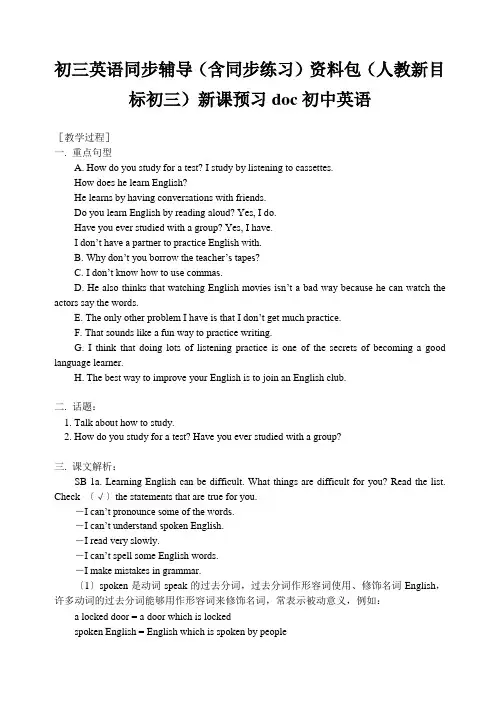
初三英语同步辅导(含同步练习)资料包(人教新目标初三)新课预习doc初中英语[教学过程]一. 重点句型A. How do you study for a test? I study by listening to cassettes.How does he learn English?He learns by having conversations with friends.Do you learn English by reading aloud? Yes, I do.Have you ever studied with a group? Yes, I have.I don’t have a partner to practice English with.B. Why don’t you borrow the teacher’s tapes?C. I don’t know how to use commas.D. He also thinks that watching English mov ies isn’t a bad way because he can watch the actors say the words.E. The only other problem I have is that I don’t get much practice.F. That sounds like a fun way to practice writing.G. I think that doing lots of listening practice is one of the secrets of becoming a good language learner.H. The best way to improve your English is to join an English club.二. 话题:1. Talk about how to study.2. How do you study for a test? Have you ever studied with a group?三. 课文解析:SB 1a. Learning English can be difficult. What things are difficult for you? Read the list. Check 〔√〕the statements that are true for you.-I can’t pronounce some of the words.-I can’t understand spoken English.-I read very slowly.-I can’t spell some English words.-I make mistakes in grammar.〔1〕spoken是动词speak的过去分词,过去分词作形容词使用、修饰名词English,许多动词的过去分词能够用作形容词来修饰名词,常表示被动意义,例如:a locked door = a door which is lockedspoken English = English which is spoken by people〔2〕make mistakes 犯错2a. ListeningTeacher: You look worried, Paul.Boy: I am, Ms Mitchell. I’m having trouble learning English.Teacher: You said you liked English. What’s the problem?Boy: I can’t get the pronunciation right.Teacher: Wel l, listening can help. Why don’t you borrow the teacher’s tapes? You can listen to them at home and repeat the sentences that are difficult for you.Boy: That’s a good idea. But what about all the new words? I forget a lot of new words.Teacher: You can always write the new words in your notebook and study them at home. You can even study in the train on the way to school.Boy: That might really help! Thanks.Teacher: Can you understand when people talk to you?Boy: Well, no. Not al ways. Sometimes I just don’t understand what people are saying.Teacher: Why don’t you join an English language club to practice speaking English? The English club meets after school on Tuesdays and Thursdays.Boy: Maybe I’ll go. The only other problem I have is that I don’t get much writing practice.Teacher: Maybe you should find a pen pal.Boy: That sounds like a fun way to practice writing. Thanks, Ms Mitchell.3a. Read the article. Then read the statements about the article. Write 〝T〞〔for ture〕or 〝F〞〔for false〕.How I learned to learn EnglishLast year my English class was difficult for me. First of all〔1〕, it wasn’t easy for me to understand the teacher when she talked to the class. To begin with〔2〕, she spoke too quickly, a nd I couldn’t understand every word. Later on〔3〕, I realized〔4〕that it doesn’t matter if you don’t understand every word. Also I was afraid to〔5〕speak in class, because I thought my classmates might laugh at me. I couldn’t always make complete sentences, either. Then I started to watch English-language TV. It helped a lot. I think that doing lots of listening practice is one of the secrets of becoming a good language learner. Another〔6〕thing that I found very difficult was English grammar. So I decided to take lots of grammar notes in every class. Then I started to write my own original sentences using the grammar I was learning. It’s amazing how much this helped. Now I am enjoying learning English and I got an A this term. My teacher is very impressed.The writer found learning English difficult because…1. …the teacher’s pronunciation was poor.2. …people always laughed at her when she spoke.3. …she had trouble making complete sentences.4. …English grammar was difficult.Her English improved when she started…5. …going out with English-speaking friends.6. …lots of speaking practice.7. …using grammar in original sentences.〔1〕〝first of all〞意为〝第一,第一〞,above all也有〝第一〞的意思,但两者有区不。
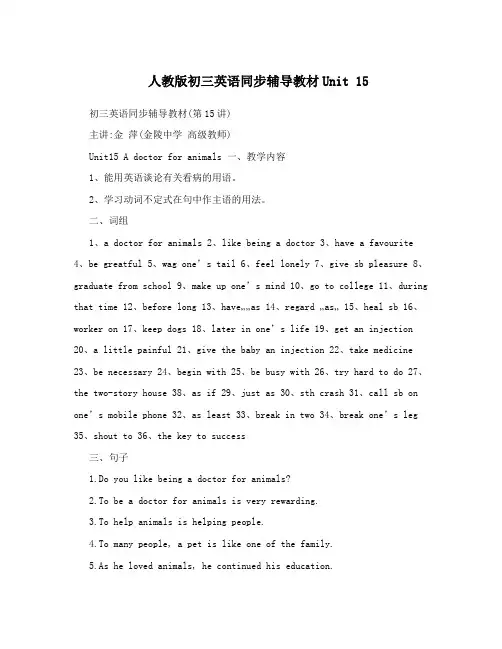
人教版初三英语同步辅导教材Unit 15 初三英语同步辅导教材(第15讲)主讲:金萍(金陵中学高级教师)Unit15 A doctor for animals 一、教学内容1、能用英语谈论有关看病的用语。
2、学习动词不定式在句中作主语的用法。
二、词组1、a doctor for animals2、like being a doctor3、have a favourite4、be greatful5、wag one’s tail6、feel lonely7、give sb pleasure8、graduate from school9、make up one’s mind 10、go to college 11、during that time 12、before long 13、have……as 14、regard …as… 15、heal sb 16、worker on 17、keep dogs 18、later in one’s life 19、get an injection 20、a little painful 21、give the baby an injection 22、take medicine 23、be necessary 24、begin with 25、be busy with 26、try hard to do 27、the two-story house 38、as if 29、just as 30、sth crash 31、call sb on one’s mobile phone 32、as least 33、break in two 34、break one’s leg35、shout to 36、the key to success三、句子1.Do you like being a doctor for animals?2.To be a doctor for animals is very rewarding.3.To help animals is helping people.4.To many people, a pet is like one of the family.5.As he loved animals, he continued his education.6.Before long, Her riot noticed that people in the country also, had dogs as pets.7.It is important to do what the doctor tells you.8.It is true to say a dog is men’s best friend or at leastRobert’s best friends. 9.It’s better to give than to receive.四、难点讲解1.reward n.报酬、奖赏He worked hard without any hope of reward.他辛勤工作却不期待报酬。
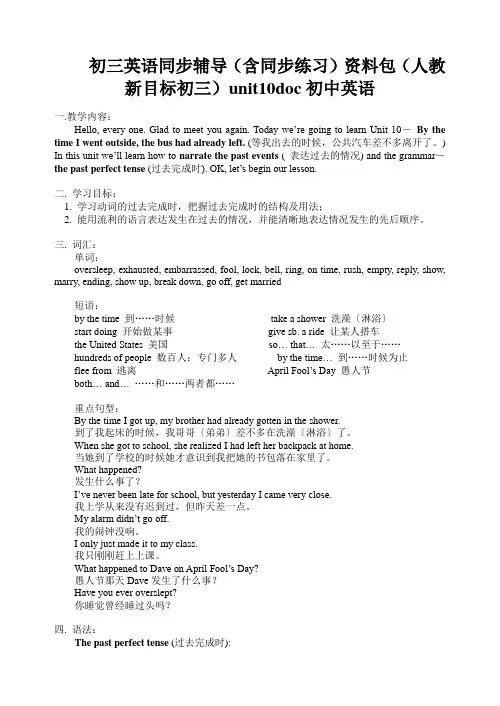
初三英语同步辅导(含同步练习)资料包(人教新目标初三)unit10doc初中英语一.教学内容:Hello, every one. Glad to meet you again. Today we’re going to learn Unit 10-By the time I went outside, the bus had already left. (等我出去的时候,公共汽车差不多离开了。
) In this unit we’ll learn how to narrate the past events ( 表达过去的情况) and the grammar-the past perfect tense (过去完成时). OK, let’s begin our lesson.二. 学习目标:1. 学习动词的过去完成时,把握过去完成时的结构及用法;2. 能用流利的语言表达发生在过去的情况,并能清晰地表达情况发生的先后顺序。
三. 词汇:单词:oversleep, exhausted, embarrassed, fool, lock, bell, ring, on time, rush, empty, reply, show, marry, ending, show up, break down, go off, get married短语:by the time 到……时候take a shower 洗澡〔淋浴〕start doing 开始做某事give sb. a ride 让某人搭车the United States 美国so… that… 太……以至于……hundreds of people 数百人;专门多人by the time… 到……时候为止flee from 逃离April Fool’s Day 愚人节both… and… ……和……两者都……重点句型:By the time I got up, my brother had already gotten in the shower.到了我起床的时候,我哥哥〔弟弟〕差不多在洗澡〔淋浴〕了。
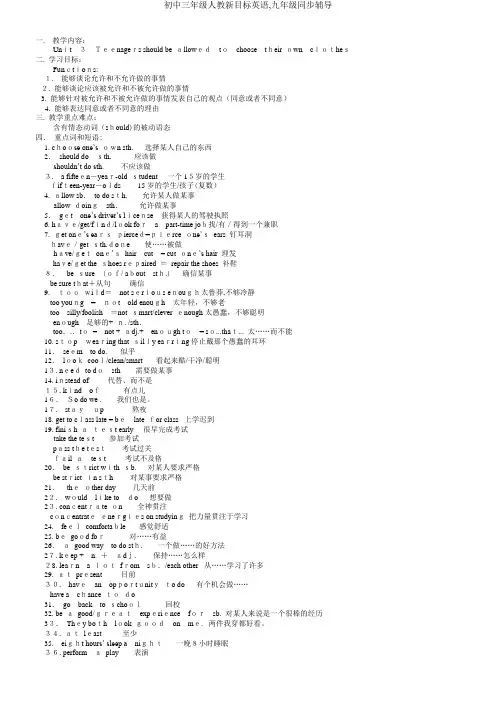
初中三年级人教新目标英语,九年级同步辅导一.教学内容:Unit3Teenagers should be allowedtochoose their own clothes二. 学习目标:Functions:1.能够谈论允许和不允许做的事情2. 能够谈论应该被允许和不被允许做的事情3. 能够针对被允许和不被允许做的事情发表自己的观点(同意或者不同意)4. 能够表达同意或者不同意的理由三. 教学重点难点:含有情态动词(should)的被动语态四.重点词和短语:1. choose one’s own sth. 选择某人自己的东西2.should dosth. 应该做shouldn’t do sth.不应该做3. a fifteen-year-old student 一个15岁的学生fifteen-year-olds 15岁的学生/孩子(复数)4. allow sb.to do sth. 允许某人做某事allow doingsth.允许做某事5.get one’s driver’s license 获得某人的驾驶执照6. have/get/find/look fora part-time job找/有/得到一个兼职7. get one’s earspierced=pierce one’sears 钉耳洞have/get sth.done 使……被做have/getone’shair cut= cut one’s hair 理发have/get the shoes repaired =repair the shoes 补鞋8.be sure(of/ about sth.)确信某事be sure that+从句确信9.toowild=not serious enough太鲁莽,不够冷静too young=not old enough 太年轻,不够老too silly/foolish=not smart/clever enough太愚蠢,不够聪明enough足够的+ n. /sth.too...to=not + adj.+enough to= so...that... 太……而不能10. stopwearing that silly earring停止戴那个愚蠢的耳环11.seem to do. 似乎12.lookcool/clean/smart 看起来酷/干净/聪明13. needto dosth 需要做某事14. instead of 代替、而不是15. kind of有点儿16.So do we . 我们也是。
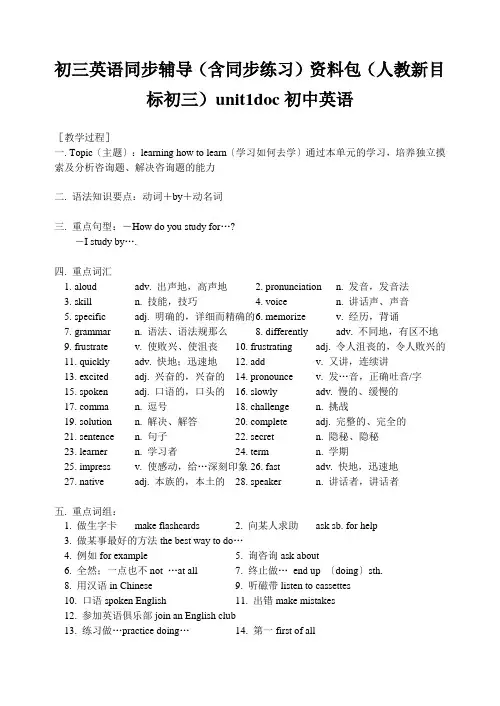
初三英语同步辅导(含同步练习)资料包(人教新目标初三)unit1doc初中英语[教学过程]一. Topic〔主题〕:learning how to learn〔学习如何去学〕通过本单元的学习,培养独立摸索及分析咨询题、解决咨询题的能力二. 语法知识要点:动词+by+动名词三. 重点句型:-How do you study for…?-I study by….四. 重点词汇1. aloud adv. 出声地,高声地2. pronunciation n. 发音,发音法3. skill n. 技能,技巧4. voice n. 讲话声、声音5. specific adj. 明确的,详细而精确的6. memorize v. 经历,背诵7. grammar n. 语法、语法规那么8. differently adv. 不同地,有区不地9. frustrate v. 使败兴、使沮丧10. frustrating adj. 令人沮丧的,令人败兴的11. quickly adv. 快地;迅速地12. add v. 又讲,连续讲13. excited adj. 兴奋的,兴奋的14. pronounce v. 发…音,正确吐音/字15. spoken adj. 口语的,口头的16. slowly adv. 慢的、缓慢的17. comma n. 逗号18. challenge n. 挑战19. solution n. 解决、解答20. complete adj. 完整的、完全的21. sentence n. 句子22. secret n. 隐秘、隐秘23. learner n. 学习者24. term n. 学期25. impress v. 使感动,给…深刻印象26. fast adv. 快地,迅速地27. native adj. 本族的,本土的28. speaker n. 讲话者,讲话者五. 重点词组:1. 做生字卡make flashcards2. 向某人求助ask sb. for help3. 做某事最好的方法the best way to do…4. 例如for example5. 询咨询ask about6. 全然;一点也不not …at all7. 终止做…end up 〔doing〕sth.8. 用汉语in Chinese 9. 听磁带listen to cassettes10. 口语spoken English 11. 出错make mistakes12. 参加英语俱乐部join an English club13. 练习做…practice doing…14. 第一first of all15. 开始to begin with 16. 后来later on17. 不敢做…be afraid to do…18. 在课堂上in class19. 造句make sentences 20. 作笔记take notes21. 决定做…decide to do…22. 喜爱做…enjoy doing sth.23. 写下;记下write down 24. 组成make up25. 在去…路上on one’s way to26. 因…而惭愧be ashamed of27. 过时behind the times 28. 关闭turn off29. 嘲笑laugh at 30. 最糟糕的是worst of all31. 适应;适合fit in 32. 现在;现在these days33. 成为…高手become an expert at 34. 舍弃give up35. 向某人道不say goodbye to sb. 36. 考虑think about六. 课文解析I. 1a Check 〔√〕the ways you study for an English test. Then add other ways you use sometimes.--by working with friends --by listening to cassettes--by making flashcards --by asking the teacher for help--by reading the textbook --__________________--by making vocabulary lists --__________________1. 〝by+动名词〞常常表示手段、方式或方法,能够用来回答〝how〞引导的专门疑咨询句eg: -How did you finish the job so soon?你是用什么方法这么快就干完了?--By climbing on the roof.我爬到屋顶上做的。
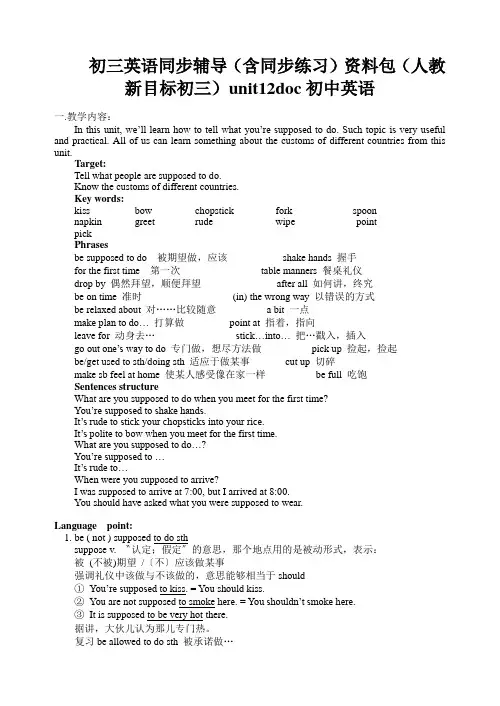
初三英语同步辅导(含同步练习)资料包(人教新目标初三)unit12doc初中英语一.教学内容:In this unit, we’ll learn how to tell what you’re supposed to do. Such topic is very useful and practical. All of us can learn something about the customs of different countries from this unit.Target:Tell what people are supposed to do.Know the customs of different countries.Key words:kiss bow chopstick fork spoonnapkin greet rude wipe pointpickPhrasesbe supposed to do 被期望做,应该shake hands 握手for the first time 第一次table manners 餐桌礼仪drop by 偶然拜望,顺便拜望after all 如何讲,终究be on time 准时(in) the wrong way 以错误的方式be relaxed about 对……比较随意 a bit 一点make plan to do… 打算做point at 指着,指向leave for 动身去…stick…into… 把…戳入,插入go out one’s way to do 专门做,想尽方法做pick up 捡起,捡起be/get used to sth/doing sth 适应于做某事cut up 切碎make sb feel at home 使某人感受像在家一样be full 吃饱Sentences structureWhat are you supposed to do when you meet for the first time?You’re supposed to shake hands.It’s rude to stick your chopsticks into your rice.It’s polite to bow when you meet for the first time.What are you supposed to do…?You’re supposed to …It’s rude to…When were you supposed to arrive?I was supposed to arrive at 7:00, but I arrived at 8:00.You should have asked what you were supposed to wear.Language point:1. be ( not ) supposed to do sthsuppose v. 〝认定;假定〞的意思,那个地点用的是被动形式,表示:被(不被)期望/〔不〕应该做某事强调礼仪中该做与不该做的,意思能够相当于should①You’re supposed to kiss. = You should kiss.②You are not supposed to smoke here. = You shouldn’t smoke here.③It is supposed to be very hot there.据讲,大伙儿认为那儿专门热。
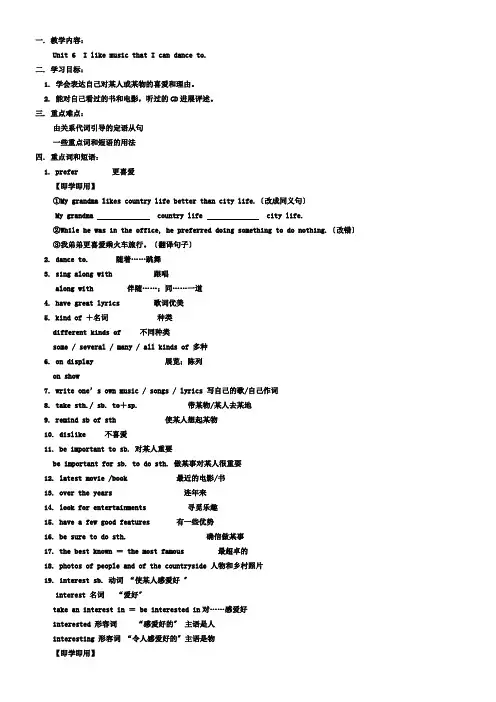
一. 教学内容:Unit 6 I like music that I can dance to.二. 学习目标:1. 学会表达自己对某人或某物的喜爱和理由。
2. 能对自己看过的书和电影,听过的CD进展评述。
三. 重点难点:由关系代词引导的定语从句一些重点词和短语的用法四. 重点词和短语:1. prefer 更喜爱【即学即用】①My grandma likes country life better than city life.〔改成同义句〕My grandma country life city life.②While he was in the office, he preferred doing something to do nothing.〔改错〕③我弟弟更喜爱乘火车旅行。
〔翻译句子〕2. dance to. 随着……跳舞3. sing along with 跟唱along with 伴随……;同……一道4. have great lyrics 歌词优美5. kind of +名词种类different kinds of 不同种类some / several / many / all kinds of 多种6. on display 展览;陈列on show7. write one’s own music / songs / lyrics 写自己的歌/自己作词8. take sth./ sb. to+sp. 带某物/某人去某地9. remind sb of sth 使某人想起某物10. dislike 不喜爱11. be important to sb. 对某人重要be important for sb. to do sth. 做某事对某人很重要12. latest movie /book 最近的电影/书13. over the years 连年来14. look for entertainments 寻觅乐趣15. have a few good features 有一些优势16. be sure to do sth. 确信做某事17. the best known = the most famous 最超卓的18. photos of people and of the countryside 人物和乡村照片19. interest sb. 动词“使某人感爱好〞interest 名词“爱好〞take an interest in = be interested in对……感爱好interested 形容词“感爱好的〞主语是人interesting 形容词“令人感爱好的〞主语是物【即学即用】用interest的适当形式填空①What Ben is all the history of these places.②Harry Potter is a very book. Children are all in it.20. a world class sb / photographer 世界级人物/摄影大师21. pretty strange 十分奇怪a pretty girl 一个漂亮的女孩22. come and go 潮起潮落/兴盛衰败23. go on a vacation 去度假24. a great place to visit 一个参观的好地址25. lucky to be here 很幸运能在这儿26. six-month English course 六个月的英语课程27. so much to see and do 许多可看可做的事28. suit sb〔fine〕适合29. taste good/delicious/bad/sweet 尝起来美味/难吃/甜30. a group of young people 一群年青人31. get together 聚在一路32. keep healthy= stay healthy 维持安康33. to be honest 老实说;说实在的34. be bad for 对……有害be good for 对……有益处be good at=do well in 擅擅长……35. take care of 照顾36. stay away from 与……维持距离37. be in agreement 意见一致的38. actually=in fact 事实上39. increase the risk of cancer 增大致癌机率40. even if 即便41. eat a balanced diet 饮食均衡五. 重点、难点、考点及疑点注释1. I prefer music that has great lyrics.我更喜爱有好歌词的音乐。
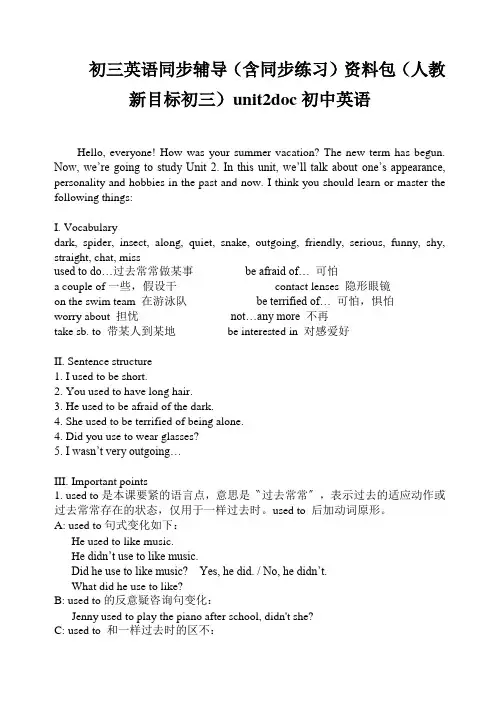
初三英语同步辅导(含同步练习)资料包(人教新目标初三)unit2doc初中英语Hello, everyone! How was your summer vacation? The new term has begun. Now, we’re going to study Unit 2. In this unit, we’ll talk about one’s appearance, personality and hobbies in the past and now. I think you should learn or master the following things:I. Vocabularydark, spider, insect, along, quiet, snake, outgoing, friendly, serious, funny, shy, straight, chat, missused to do…过去常常做某事be afraid of… 可怕a couple of一些,假设干contact lenses 隐形眼镜on the swim team 在游泳队be terrified of… 可怕,惧怕worry about 担忧not…any more 不再take sb. to 带某人到某地be interested in 对感爱好II. Sentence structure1. I used to be short.2. You used to have long hair.3. He used to be afraid of the dark.4. She used to be terrified of being alone.4. Did you use to wear glasses?5. I wasn’t very outgoing…III. Important points1. used to是本课要紧的语言点,意思是〝过去常常〞,表示过去的适应动作或过去常常存在的状态,仅用于一样过去时。
初三英语同步辅导(含同步练习)资料包(人教新目标初三)unit6doc初中英语Hello, everyone. Glad to meet you again. Today we’re going to study Unit 6 〝I like music that I can dance to. 〞In this unit we’re going to study how to express preference. Maybe you ’re interested in this topic, I think. Ok, let’s begin.二. 教学目标:1. 表达偏爱并讲明其理由;2. 初步了解定语从句。
三. 教学内容:Words and phrases 〔词汇〕:prefer, lyric, gentle, dislike, heart, exhibition, photograph, energy, sink, latest , Yellow River, fisherman, entertainment, feature, gallery, class, whatever, miss, okay, honest, expectdance to the music 随着音乐跳舞different kind of music 不同种类的音乐remind of 提醒;使唤起over the years 数年;多年be sure to do sth. 一定〔确信〕做某事on display 陈设;展览be important to sb. 对某人专门重要 a movie poster 一张电影海报Important sentences 〔重点句型〕:I like music that I can dance to.我喜爱能伴舞的音乐。
I prefer music that has great lyrics.我更喜爱歌词好的音乐。
一. 教学内容:Unit 2 I used to be afraid of dark.[语言方针] Language goal:Talk about what you used to be like. 谈论你过去的外表。
[学习方针]Functions:1. 学会陈述本身过去常做的事情2. 学会陈述本身过去的爱好等3. 能够表达本身现在和过去在外表、性格、娱乐等方面的变化4. 能够表达伴侣、家人等现在和过去的变化二. 教学重点难点:短语used to 的用法三. 重点词和短语:1. used to 过去常常2. be afraid of=be terrified of 害怕3. a couple of days 两天4. look different 看起来分歧look the same 看起来一样5. wear glasses/contact lenses 戴眼镜/隐型眼镜6. have a great memory 记性很好7. have long/straight/curly hair 留着……发型8. be interested in =take an interest in 对……感兴趣9. on the swim team 在游泳队10. People sure change. 人是会变的。
11. be/live alone 独处/单独居住feel lonely 感觉孤独12. speak in front of a group 在众人面前讲话13. go to sleep with the light on 开着灯睡觉14. worry about sth./ sb.=be worried about sth./sb. 担心15. study all the time 一直学习16. go right home 直接回家17. spend time (in)doing sth. 花时间做某事18. no longer=not. . . any longer 不再(延续性)no more=not…any more不再(短暂性)19. chat with sb. 与……聊天20. take sb. to a concert 带或人去音乐会21. hardly ever 几乎不22. miss the old days 怀念/想念过去的那些日子23. in the last few years 近几年24. daily life 日常生活25. make sb. stressed out 使或人精疲力尽26. a fifteen-year-old boy 一个15岁的男孩27. problem child 问题少年28. afford sth./to do sth. 肩负得起He couldn’t afford to pay for his child’s education.29. as…as与……一样as well as…与……一样好,也as well as she could 尽她全力30. get into trouble with the police 与警察发生冲突31. be patient with sb. 对……有耐心32. in the end 最后33. make a decision on sth./doing sth. 决意做某事=make up one’s mind to do sth.=decide to do sth.34. send sb. to+地点送或人去某地35. cause a lot of trouble (for sb. )引起很多麻烦36. leave the school 退学37. waste one’s time浪费时间38. to one’s surprise使或人吃惊be surprised at sth. 吃惊于……To my surprise, a phone call changed his life.39. feel good about himself 很有自信40. head teacher 班主任41. It’s necessary to do sth.必需做某事42. even though=even if (+让步状语从句)即使Even though he is eighty, he looks young and healthy.43. take pride in=feel/be proud of 为……而高慢I take pride in being a Chinese.I am/feel proud of being a Chinese.44. give up 放弃Don’t give up. 不要放弃。
初三英语同步辅导(含同步练习)资料包(人教新目标初三)unit7doc初中英语V ocabulary:Jungle, thrilling, fascinating, relaxing, peaceful, educational, trek, touristy, pack, provide, spotlight, consider, including, convenient, unless, translatePhrases:go trekking 长途跋涉take it easy 不紧张,放轻松hope to do 期望做某事some day 有一天one day 某一天consider doing sth 考虑做某事in general 通常,大体上be supposed to do…应该depend on 依…而定,取决于take a trip 度假provide sb with sth / provide sth for sb 给某人提供…be away 离开Eiffel Tower 埃菲尔铁塔Notre Dame Cathedral 巴黎圣母院in the future 今后continue doing sth 连续做某事dream of / about 妄图be willing to do sth 情愿做on the other hand 另一方面hold on 坚持come true 〔妄图〕成真,实现on vacation 在度假Sentences patterns:Where would you like to visit?I’d like to go somewhere relaxing. / I ho pe to go to France some day.I’d like to trek through the jungle, because I like exciting vacations.I love places where the people are really friendly.Language points:Section A1. Where would you like to go on vacation?* would like to 表示〝想要〞,是一种委婉礼貌的讲法:would like+名词或代词,意为〝想要〞I’d like a new computer.would like to do 意为〝想做〞She’d like to see her uncle this Sunday.*would like与want区不:二者都有〝想要〞的意思,后面都能够加名词或to do的形式,但would like比want 更加委婉。
初三英语同步辅导(含同步练习)资料包(人教新目标初三)reviewofunit1~5doc初中英语Unit 1—5知识点归纳:Unit 1 How do you study for a test?重点词汇:pronounce pronunciation understand frustratingmemorize differently excited challengesolution completenative speaker讲本族语的人write notes 记笔记make up conversations编对话as a second language作为另一种语言around the world 全世界help sb. do sth.关心某人做某事watch sb. do sth.观看某人做某事improve English提高英语get lots of practice得到许多锤炼have fun娱乐,有味not… at all一点也不get excited about sth.对某事专门兴奋end up终止ask sb. about sth. 咨询某人某事the best way to do…做……的最好方法 a great way to do…做……的专门好的方法specific suggestions明确的、专门的意见memorize the new words记生词help a little/ a lot 有一点/专门大关心feel differently感受不同make mistakes 犯错误be afraid to do sth. 怕做某事Ways of learning English:听磁带做认读卡做词汇表朗读课文和朋友一起学习请老师帮忙做笔记和一个小组共同学习看录像带参加学习小组和朋友一起练习对话朗读练习发音唱英语歌学习语法读英语报纸请家教Grammar focus1. How do you study for a test?I study by listening to tapes.2. How do you learn English?I learn by studying with a group.3. Do you learn English by reading aloud?Yes, I do.e.g. How do you study English?I study by listening to cassettes / studying with a group / watching TV / listening to English language music / taking part in English classes after school / getting an English tutor / reading English magazines / surfing the Internet …Do you learn English by …?Yes, I do. / No, I don’t.Sentence Strures:1. How do you study for tests?Well, I study by working with my classmates.2. Have you ever studied with a group?Yes, I have. I’ve learned a lot that way.3. I’m having trouble learning English.I can’t get the pronunciation right.4. What about reading aloud to practice pronunciation?I do that sometimes. I think it helps.Why don’t you join an English language club to practice speaking English?Maybe you should join an English club.5. The best way to learn new words is by reading English magazines.Studying grammar is a great way to learn a language.Memorizing the words of pop songs helps a little.Difficulties1. I can’t read fluently.2. I can’t spell some English words.3. I can’t understand spoken English.4. I can’t pronounce so me of the words.5. I make mistakes in Grammar.6. I can’t understand the words in newspapers and magazines.7. I don’t get much writing practice.Solutions1. Maybe you should find a pen pal.2. You can always write the new words in your notebook and learn them at home.3. Why don’t you join an English language club?4. You can write English diary every day.5. Listening can help.6. They learnt by using English.7. The best way to learn English words is by reading English magazines.8. He thinks studying grammar is a great way to learn a language.9. Watching English movies isn’t a bad way.10. Joining the English club is the best way to improve your English.语法:V+ing总结:动名词如何用?一. 介词后面的动词要变为动名词〔-ing动词〕1. study/learn by watching/listening…2. What/How about reading/speaking…3. …is one of the secrets of becoming a good language learner.4. When we ask about studying grammar, she said…5. Thank you for inviting me.二. 作主语的动词要变为动名词〔-ing动词〕1. Studying grammar is a great way to learn English.〔句子的主语〕2. I think watching English movies isn’t a bad way.〔从句的主语〕3. Listening can help. 〔句子的主语〕Memorizing the words of pop songs helped a little.He thinks studying grammar is a great way to learn a language.语的单复数e.g. Studying English is very important.Listening more improves listening skills.Eating too much can make us fat.Eating well and sleeping well help us study well.三. 有些动词后面要接动名词We end up speaking in Chinese.Why don’t you join a club to practice speaking English?Now I am enjoying learning English.I finish reading the book.Would you mind taking out the trash?I often spend money buying books.四. 有些词组里用动名词reading skills阅读技巧speaking skills口语技巧listening practice听力练习writing practice写作练习注意:spoken English 口头英语written English 书面英语either 和too的用法I couldn’t always make complete sentences, either.否定句I often watch English movies, too.确信句Unit 2 I used to be afraid of dark.重点词汇:used to, dark, spider, insect, along, quiet, snake, outgoing, friendly, serious, funny, outgoing, friendly, serious, funny, tall, shy, short, straight, long hair.Grammar Focus:1. I wasn’t very outgoing.You used to have long hair.2. Did you use to have straight hair? Yes, I did.3. Did you use to play the piano? No, I didn’t.语法:一. used to do sthused to中的to是不定式符号,后加动词原形,表示〝过去常常做某事,而现在已不做〞,时态形式不变。
初三英语同步辅导(含同步练习)资料包(人教新目标初三)unit8doc初中英语教学目标:1. 学会提供关心〔用I will, I would like等〕;2. 学会用I will…做规划;3. 把握多种动词词组的用法;4. 学会关注社会,关怀他人。
重点词汇:1.cheer up 使振奋、快乐2.clean up 打扫洁净3.set up 摆放,建立e up with 提出(咨询题)5.hand out 分发,发放6.put up 建立,公布7.write down 写下,记下8.try to do sth. 尽力做某事9.help out 关心〔某人〕摆脱逆境10.run out of 耗尽,用光11.take after 与…相像12.fix up 修理13.give away 赠送,分发14.work out 制定出,算出15.give out 发放,消耗尽16.ask for 要求、索要17.not only...but also… 不但…而且…18.not... any more 不再…19.be similar to 与…相似20. put … off 延期,推迟21.be proud of 因…而自豪;自豪22. be similar to 与…相似hunger, sign, repair重点句型:1. I’d like to work outside.2. I’ll help clean up the city parks.3. You could give out food at a food bank.4. I would like to fix up the desks.5. If you see these things, or problems, what will you do?6. What kind of volunteer work would you like to do?7. He looks sad. Let’s cheer him up.8. We’re going to set up a food bank to help hungry people.9. We need to come up with some ideas.重点语法:短语动词1. 现代英语中,动词之后加介词或副词构成短语,表达一种特定的含义,称为短语动词。
初三英语同步辅导(含同步练习)资料包(人教新目标初三)unit14doc初中英语Hello, boys and girls. Nice to meet you again. Today we’re going to study Unit 9—Have you pocked yet?(你整理好行装了吗?) In this unit we’ll review the grammar—the present perfect tense(现在完成时) .In the same time we’re going to learn how to prepare for traveling. Now let’s begin our class.学习目标:1.复习动词的现在完成时态。
2.能用比较流利通顺的语言讲述周围发生的事。
词汇:water (v.), travel, guide book, suitcase, bathing suit, refrigerator, member, wood, farm, ocean, appear, turn, anyway, hitclean out 清除;打扫洁净be off 离开;走开beach towel 沙滩巾in a minute 过一会儿turn off 关闭on the music scene 在音乐舞台上be sure to do sth. 确定做某事in the last twelve months在过去的十二个月里具体内容讲解I. Sections:1.Have you packed the beach towels yet? 你把沙滩巾打包到里面去了吗?大伙儿明白此句用的是现在完成时。
副词yet常用于现在完成时的疑咨询句和否定句中,而在确信句中那么用already,如:I have already packed the beach towels. 我差不多把沙滩巾打包到里面去了。
一、教学内容Unit 14 Have you packed yet?二、学习目标1. 通过询问是否为旅行作好准备,了解现在完成时的用法,比较与一般过去时的区别,以便能在日常生活中正确运用。
2. 通过本单元的学习,使我们懂得生活,学会生活,培养独立生活的能力。
三、教学重点难点现在完成时的用法及现在完成时与一般过去时的区别;本模块中的一些重点短语。
四、重点词和短语1. pack sth. 打包某物2. yet 已经,还already【即学即用】(1) —Has your father finished his work ?—No, he hasn’t.A. alreadyB. yetC. agoD. just(2) I have already finished reading the book. (变成否定句)I finished reading the book .3. clean out 清除clean up4. in a minute = immediately = at once= right away/now 立即/马上5. take the dog for a walk 带狗去散步go for a walk 去散步have a walk with sb. 和某人去散步6. do some cleaning/reading 清扫/阅读do some shopping =go shopping 购物do chores=do the housework 做家务7. chat to/with sb. 与某人聊天8. light the fire for breakfast 生火做饭light n.电灯;光light adj. 浅的;轻的lighting n. 照明, 照明设备lighter n. 打火机【即学即用】(1) He told me that travels much faster than sound.A. lightB. lightsC. lightingD. lighted(2) After they settled down, they the fire and began to cook.A. lightedB. litC. are lightingD. light9. take care 保重10. write original songs 写原创歌曲11. win an award 获得奖项12. be on TV 上电视appear on TV 在电视上出现13. make a hit CD 制作一张非常成功的CD14. lead singer/actor 主唱/主演15. in the top ten 排行榜前十名16. hope to have a number one hit some day 希望有一天有一首歌能排在第一名17. say goodbye to sb. 向某人道别18. It’s one’s turn to do sth.轮到某人做某事do sth. in turns 轮流做某事turn right/left 向右/左转19. overseas Chinese 华侨20. look for one’s families’ roots 寻找某人家族的根源in search of roots 追述根源22. so far 到目前为止【即学即用】So far, I (learn) 18 English songs.23. thanks to 幸亏;由于thank sb. for doing sth. 为……而感谢某人24. believe strongly 坚信25. the purpose of sth./doing sth. 做某事的目的26. look forwards to doing sth. 期待做某事五、重点、难点、考点及疑点注释1. Sorry I couldn’t get back to you sooner. 请原谅我没能很快给你回信。
(Section A, 3a)(1)get back to sb. 意为“给……回信”(= write back to sb.)。
如:I will get back to my mother. 我将给我妈妈回信。
(2)sooner是副词soon 的比较级,放在句末作状语。
soon 可置于句末、句中,有时也可放在句首。
如果谓语动词是be,则位于be 之后。
如:Soon her mother will go to Europe. 不久他母亲就要去欧洲了。
I have to go home very soon. 我很快就得回家了。
The sooner, the better. 越快越好。
2. In the past twelve months, the y’ve had three major concerts and made a hit CD. 在过去的十二个月里,他们举办了三场较大的音乐会,出版了一张很受欢迎的CD唱片。
(Section B, 3a)(1)“in the past+时间段”常用于完成时的句子中,表示“在过去的……时间里”,past是形容词,可以用last来替换,而past/last的后面通常要使用“数字+名词”的结构。
In the past/last two years, she has studied English very hard.在过去的两年里,她一直在努力地学英语。
(2)短语make a hit表示“大获成功”、“(演出等)大受欢迎;受到赞扬”等,hit是名词,表示成功而风行一时的事物,如电影,歌曲,演出等。
Zhou Jielun has just made a hit CD. 周杰伦刚出版了一盘轰动一时的CD。
His song was a great hit. 他的歌曲轰动一时。
He made a great hit in teaching. 他曾在教学上获得了巨大的成功。
3. And then they’re going to go on a world tour in which they will perform in ten different cities. 然后,他们将去世界各地旅行并在十个不同的城市巡回演出。
(Section B, 3a)...in which they will perform in ten different cities是定语从句,先行词是tour, 在关系代词which前介词in通常的位置是在动词perform的后面。
本句为了避免与in ten different cities短语中的in重复,将perform后的第一个in前置。
句中perform主要指扮演角色,演奏某种乐器,演出某一节目,侧重能力,技巧,效果,可用作及物动词和不及物动词。
He performs perfectly on the piano. 他的钢琴演奏太棒了。
She is learning how to perform. 她正在学习怎样表演。
4. Be sure not to miss them if they come to a city near you —if you can get tickets, that is.如果他们来到你附近的城市,千万不要错过——当然,如果你能弄到票的话。
(Section B, 3a)(1)句中的that is表示“确切地;换句话说;也就是”,用来表达一个准确的说法,即对前面的内容加以准确地说明。
She’s a housewife —when she’s not teaching English, that is.她是个家庭主妇——是指她不教英语的时候。
(2)句中miss是“错过”,后接名词、代词或V-ing形式,不可接不定式。
They missed the train by two minutes.他们差了两分钟没赶上火车。
I came late and missed seeing the beginning of the movie.我来晚了,没有看见电影的开始部分。
5. ...but we really hope to have a number one hit some day. ……但是我们真的希望有朝一日我们制作出能卖得最好的一首歌。
(Section B, 3a)some day意为“将来某一日”,等于someday, 与one day是近义词。
some day/someday只表示将来,不表示过去。
而one day 用在过去时的句子里是“有一天”的意思,用在将来时的句子里是“将有一天”,与some day/someday可互换。
He will be a scientist some day.总有一天他会成为科学家。
I hope to see you one day/someday.我希望有一天会看到你。
One day last summer they made a trip to the country.去年夏天某日他们到乡间旅行。
试译:有一天你一定要来看我。
You must come one day to see me.You must come some day to see me.You must come to see me someday.魔力纠错他有一天来看了我。
误:He came some day to see me.正:He came one day to see me.6. ...and so far has brought thousands of overseas Chinese students... ……到目前为止,它带来了成千上万的海外华裔学生……(Reading)so far 意思是“到目前为止”,常用于完成时,表示动作从过去开始一直延续到现在,强调到目前为止的情况,可位于句首,也可位于句末。
So far, no man has traveled farther than the moon.到现在为止,还没有人到过比月球更远的地方。
How many travelers have been to Disneyland so far?到现在为止有多少旅客到过迪斯尼乐园?S o far we haven’t got any news from them.到目前为止,我们还没有得到他们的任何消息。
7. Most, like Robert, can hardly speak any Chinese, and have never been to China before. 像罗伯特一样,大多数人几乎都不会说中文,而且以前从来没有到过中国。